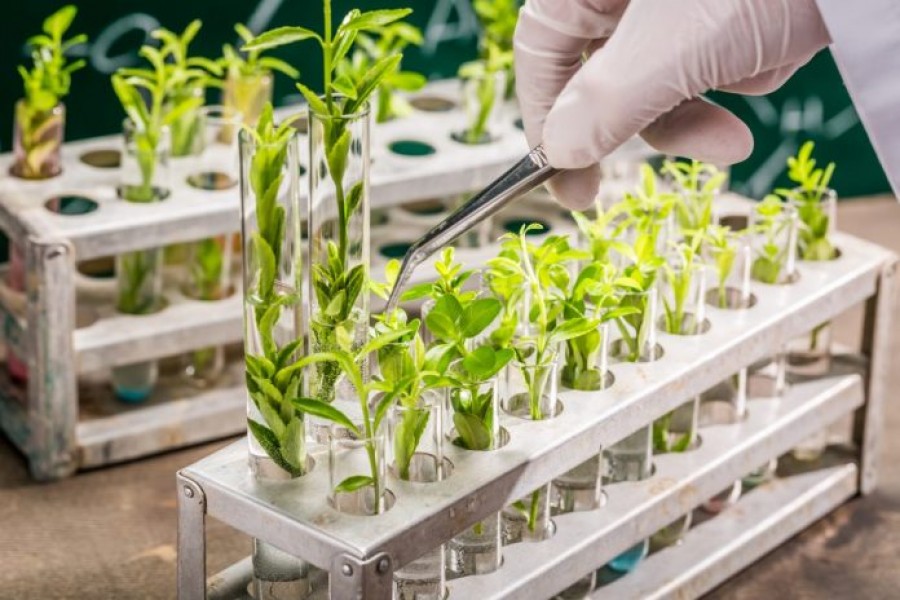
Published :
Updated :

Most of the high yielding crops, fruits or vegetables that are growing all over the world today are the blessings of plant breeding. Bangladesh is an overpopulated country with limited land resources. Plant breeding is the only answer to ensure food security in the country.
Scientists and researchers here are working on developing new, more productive crop varieties, filled with high proteins, vitamins or other essential nutrients, resistant to different diseases, salinity and drought.
The government is focusing on the modernisation of agriculture, and many research institutes like Bangladesh Agricultural Research Institute (BARI), Bangladesh Rice Research Institute (BRRI), Bangladesh Institute of Nuclear Research (BINA), Bangladesh Jute Research Institute (BJRI), and Bangladesh Sugar crop Research Institute (BSRI) are working to develop new varieties.
Professor Dr Md Ashraful Haque from the Department of Genetics and Plant Breeding, Bangladesh Agricultural University, shared some insights regarding plant breeding. He shared the recent success of a research team under the Vice-Chancellor of BAU Professor Dr Lutful Hassan. The team developed a new variety called BAU Dhan-3. It has 10 pairs of blast resistance genes.
“Plant breeding is an applied science where breeders are using molecular biology, genetic engineering, statistical analysis etc. to create genetic variation and new varieties. Different organisations namely BINA, BARI, BRRI and universities like BAU, SAU, BSMRAU, KAU etc. are also working for crop development. Besides public-private partnership, professors and researchers are also working as plant breeding experts in private companies after their retirement,” said Prof. Ashraful.
Breeders are developing many hybrid varieties which are highly productive and farmers are also happy for their high yielding abilities. Many govt. and non-govt. organisations are also trying to bring hybrid crops to the market every year and selling those seeds to the farmers.
A farmer named Shapan Chandra Sikder from Indrakathi village of Barisal Sadar shared that hybrid rice and vegetable production truly have changed his fate. “This year I am cultivating hybrid mustard whose yield will be much higher than usual,” said the happy man. Sunil Chandra Halder, a marginal farmer from the same village, said, “If improved varieties of seeds can increase our yield, we must accept it.”
BRRI is producing hybrid rice namely BRRI Hybrid Dhan 1, 2, 3 and 5 for Boro season and BRRI Hybrid Dhan 6 for Amon season. These varieties have different types of essential properties and are made in such a way that they can become more productive with the climate of our country.
According to Digital Herbarium of Crop Plants, different hybrid vegetables are also developed in Bangladesh like BARI Hybrid Maize 1, 2, 3, 4, 5, 6, 7, 8, 9, 10 and 11, BARI Hybrid Brinjal 3 and 4, BARI Hybrid Bhutta 12 and 13, BARI Hybrid Tomato 9, 10, BARI Hybrid Misti Kumra 1, BARI Hybrid Korola 1, etc.
Former Program Head of BRAC Agriculture and Food Security Program Dr Md. Sirajul Islam believes that food security is much stable now and he wants to give the credit to plant breeding inventions.
“Bangladesh is in the third position in vegetable production and produces twice as many potatoes as it needs. Even though maize is not a local crop of Bangladesh, BARI continues to increase its yield in our country by inventing new varieties.”
He also talked about the international agricultural research institute’s praiseworthy works. "IR8 which has revolutionized the agricultural revolution in Bangladesh. Most of the scientists of BIRI are trained from IRRI. In addition, various international organisations such as CIMMYT (Mexico) and CIP (Peru) are working in Bangladesh with maize and potatoes respectively.”
According to the Agricultural Information Service (AIS), Bangladesh Rice Research Institute (BRRI) has developed hundreds of advanced technologies and seasonally suitable high yielding rice varieties and different soil, water, fertiliser, insect and disease management systems and agricultural machinery in different regions of the country.
Inventions of high yielding vegetables are important as well. BARI Lau 4 can be cultivated throughout the year. BARI Jhinga 2 is a disease and insect tolerant variety suitable for summer cultivation all over the country. By replacing the gene, BARI Bt Brinjal 1, 2, 3 and 4 have been developed which are resistant to the attack of insects that Brinjal shoot and fruit borer.
Agriculture Extension Officer (AEO) from Kishoreganj Sadar Md Abdus Salam discussed the field-level condition of plant breeding. He reaffirms that there is no substitute for hybridisation to increase production.
“Farmers want more profit. To release any variety, production should be increased. At present, BRRI Dhan 88 (Blast Resistant) and 89 are alternatives to BRRI Dhan 28 and 29, respectively. Farmers will accept them when they will improve profit.”
sopnilahmedjahin@gmail.com


 For all latest news, follow The Financial Express Google News channel.
For all latest news, follow The Financial Express Google News channel.